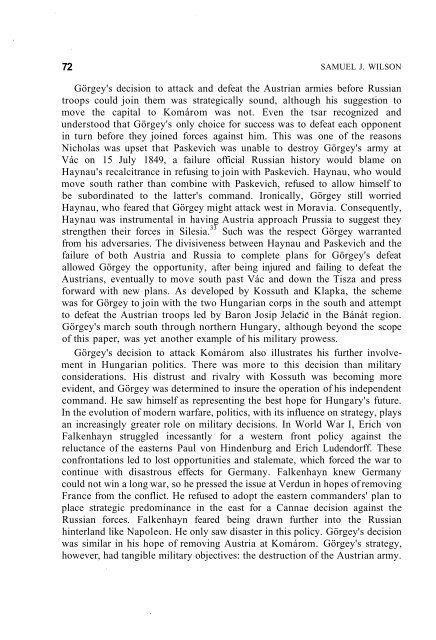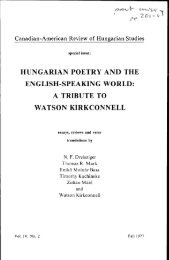72 SAMUEL J. WILSONGörgey's decision to attack and defeat the Austrian armies before Russiantroops could join them was strategically sound, although his suggestion tomove the capital to Komárom was not. Even the tsar recognized andunderstood that Görgey's only choice for success was to defeat each opponentin turn before they joined forces against him. This was one of the reasonsNicholas was upset that Paskevich was unable to destroy Görgey's army atVác on 15 July 1849, a failure official Russian history would blame onHaynau's recalcitrance in refusing to join with Paskevich. Haynau, who wouldmove south rather than combine with Paskevich, refused to allow himself tobe subordinated to the latter's command. Ironically, Görgey still worriedHaynau, who feared that Görgey might attack west in Moravia. Consequently,Haynau was instrumental in having Austria approach Prussia to suggest theystrengthen their forces in Silesia. 33 Such was the respect Görgey warrantedfrom his adversaries. The divisiveness between Haynau and Paskevich and thefailure of both Austria and Russia to complete plans for Görgey's defeatallowed Görgey the opportunity, after being injured and failing to defeat theAustrians, eventually to move south past Vác and down the Tisza and pressforward with new plans. As developed by Kossuth and Klapka, the schemewas for Görgey to join with the two Hungarian corps in the south and attemptto defeat the Austrian troops led by Baron Josip Jelacic in the Bánát region.Görgey's march south through northern Hungary, although beyond the scopeof this paper, was yet another example of his military prowess.Görgey's decision to attack Komárom also illustrates his further involvementin Hungarian politics. There was more to this decision than militaryconsiderations. His distrust and rivalry with Kossuth was becoming moreevident, and Görgey was determined to insure the operation of his independentcommand. He saw himself as representing the best hope for Hungary's future.In the evolution of modern warfare, politics, with its influence on strategy, playsan increasingly greater role on military decisions. In World War I, Erich vonFalkenhayn struggled incessantly for a western front policy against thereluctance of the easterns Paul von Hindenburg and Erich Ludendorff. Theseconfrontations led to lost opportunities and stalemate, which forced the war tocontinue with disastrous effects for Germany. Falkenhayn knew Germanycould not win a long war, so he pressed the issue at Verdun in hopes of removingFrance from the conflict. He refused to adopt the eastern commanders' plan toplace strategic predominance in the east for a Cannae decision against theRussian forces. Falkenhayn feared being drawn further into the Russianhinterland like Napoleon. He only saw disaster in this policy. Görgey's decisionwas similar in his hope of removing Austria at Komárom. Görgey's strategy,however, had tangible military objectives: the destruction of the Austrian army.
GÖRGEY, LEE, AND PERCEPTIONS 73Falkenhayn chose Verdun for its nationalistic value to the French. He plannedto bleed them white in the hopes of forcing them to surrender. Görgey hoped tofollow the strategy of Frederick II during the Seven Years' War. Outside ofnegotiations Görgey had no other recourse for military victory but to defeat hisopponents in turn before they joined forces against him.This final campaign is filled with intrigue and uncertainty on both sides.The combined Austro-Russian invasion caused contradictions and distrustamong both states as well as the Hungarian leadership. Criticism aboundedwith no group or individual beyond reproach. In such circumstances, theaccumulated stress pressed individuals to the breaking point. On the Hungarianside, however, Görgey bears the brunt of criticism. István Deák stated thatGörgey's actions during this period reflected his "confused logic with itsmixture of loyalist-legitimist and radical-revolutionary concepts." 34 Deákbelieves that Görgey's offensive, to force the issue of a negotiated peace, wouldhave been more appropriate months earlier; however, in June 1849, it was toolate and resulted only in a series of defeats and a wasteful bleeding ofHungary's best army. 35 If this was indeed the truth, it would have made sensefor Görgey to have negotiated a settlement in June rather than August 1849.Also, if there was no hope of victory and Görgey's plan was doomed to failand cause an unnecessary waste of human life, should Görgey's decision tosurrender be criticized as an act of treachery? Or was it the sound policy of asoldier-statesman? Would critics have been satisfied had Görgey, like Falkenhaynat Verdun, followed a policy that would have wasted human life withoutthe purpose of achieving a tangible objective, all for the sake of honor?Görgey's choice, along with his behavior, determined his fate in Hungarianhistoriography, but his decision spared the Hungarian nation useless sufferingand possibly might have helped to pave an easier path for reconciliation in1867. The continuation of the struggle to a futile conclusion might have leftdeeper scars between the Austrian and Hungarian combatants. A futurecompromise might have been more difficult to achieve. Continuation of thewar could only have prolonged the suffering.Like Görgey, Lee had contemplated a similar policy during the last year ofthe Civil War when he withdrew from Petersburg, Virginia, in 1865. Finally insupreme control of all Confederate forces, Lee knew, because of a lack oftroops, resources, and time, that the South's only hope for military success layin joining forces with General Joe Johnston's Army of Tennessee in <strong>No</strong>rthCarolina. They could then attack and defeat Union General William T.Sherman's army before turning their attention to Grant's forces in Virginia. IfGrant and Sherman were to join forces, defeat would be axiomatic for theSouth. Unfortunately for Lee, Grant prevented the junction of Southern forces
- Page 1 and 2:
Papers of the Radnóti Memorial Con
- Page 3:
HUNGARIAN STUDIESVOLUME 11, 1996 CO
- Page 8 and 9:
6 GEORGE GÖMÖRIprobably Fürst an
- Page 10 and 11:
8 GEORGE GÖMÖRIof the utmost impo
- Page 12 and 13:
10 GEORGE GÖMÖRIén e földön...
- Page 14 and 15:
12 GEORGE GÖMÖRINotes1. Miklós R
- Page 16 and 17:
14 MIHÁLY SZEGEDY-MASZÁKself alwa
- Page 18 and 19:
16 MIHÁLY SZEGEDY-MASZÁKtype is r
- Page 20 and 21:
18 MIHÁLY SZEGEDY-MASZÁKpose, the
- Page 22 and 23:
20 MIHÁLY SZEGEDY-MASZÁK"Wozu Dic
- Page 24 and 25: 22 MIHÁLY SZEGEDY-MASZÁKand Wilme
- Page 26 and 27: 24 MIHÁLY SZEGEDY-MASZÁKbeen the
- Page 28 and 29: 26 MIHÁLY SZEGEDY-MASZÁKBolond, k
- Page 30 and 31: 28 MIHÁLY SZEGEDY-MASZÁK6. Emery
- Page 32 and 33: 30 ZSUZSANNA OZSVÁTHand breaks as
- Page 34 and 35: 32 ZSUZSANNA OZSVÁTHThe drama echo
- Page 36: 34 ZSUZSANNA OZSVÁTHcontinents at
- Page 39 and 40: FROM CAIN TO NAHUM 37which, as Csap
- Page 41 and 42: \FROM CAIN TO NAHUM 39and bears and
- Page 43 and 44: FROM CAIN TO NAHUM 41who sees what
- Page 45 and 46: FROM CAIN TO NAHUM 438. "A félelme
- Page 47 and 48: HELP ME, PASTORAL MUSE:THE VIRGELIA
- Page 49 and 50: HELP ME, PASTORAL MUSE 47compete! W
- Page 51 and 52: HELP ME, PASTORAL MUSE 49of a priva
- Page 53 and 54: HELP ME, PASTORAL MUSE 51Once again
- Page 55 and 56: HELP ME, PASTORAL MUSE 53Eighth Ecl
- Page 57 and 58: HELP ME, PASTORAL MUSE 55have that
- Page 59: HELP ME, PASTORAL MUSE 57Paul de Ma
- Page 62 and 63: 60 SAMUEL J. WILSONWe did, however,
- Page 64 and 65: 62 SAMUEL J. WILSONbeings and contr
- Page 66 and 67: 64 SAMUEL J. WILSONHungarians would
- Page 68 and 69: 66 SAMUEL J. WILSONthe Austrians. G
- Page 70 and 71: 68 SAMUEL J. WILSONnorth-eastern Zi
- Page 72 and 73: 70 SAMUEL J. WILSONoriginally pursu
- Page 76 and 77: 74 SAMUEL J. WILSONfrom occurring,
- Page 78 and 79: 76 SAMUEL J. WILSON8. Artúr Görge
- Page 80 and 81: 78 STEVEN TÖTÖSY de ZEPETNEKtört
- Page 82 and 83: 80 STEVEN TÖTÖSY de ZEPETNEKThe c
- Page 84 and 85: 82 STEVEN TÖTÖSY de ZEPETNEKher u
- Page 86 and 87: 84 STEVEN TÖTÖSY de ZEPETNEKthe b
- Page 88 and 89: 86 STEVEN TÖTÖSY de ZEPETNEKrooti
- Page 90 and 91: 88 STEVEN TÖTÖSY de ZEPETNEKcriti
- Page 92 and 93: 90 STEVEN TÖTÖSY de ZEPETNEK'My f
- Page 94 and 95: 92 STEVEN TÖTÖSY de ZEPETNEKshe d
- Page 96 and 97: 94 STEVEN TÖTÖSY de ZEPETNEKNotes
- Page 99 and 100: BERLIN ET PARIS DE LAJOS TIHANYIVAL
- Page 101 and 102: BERLIN ET PARIS DE LAJOS TIHANYI 99
- Page 103 and 104: BERLIN ET PARIS DE LAJOS TIHANYI 10
- Page 105 and 106: BERLIN ET PARIS DE LAJOS TIHANYI 10
- Page 107 and 108: BERLIN ET PARIS DE LAJOS TIHANYI 10
- Page 109 and 110: BERLIN ET PARIS DE LAJOS TIHANYI 10
- Page 111 and 112: BERLIN ET PARIS DE LAJOS TIHANYI 10
- Page 113 and 114: BERLIN ET PARIS DE LAJOS TIHANYI 11
- Page 115: BERLIN ET PARIS DE LAJOS TIHANYI 11
- Page 118 and 119: 116 KEVIN E. KELLYfilms Lugosi made
- Page 120 and 121: 118 KEVIN E. KELLYthe provinces, no
- Page 122 and 123: 120 KEVIN E. KELLYWith his brief an
- Page 124 and 125:
122 KEVIN E. KELLYboth his and Dean
- Page 126 and 127:
124 KEVIN E. KELLYfollowed it into
- Page 128 and 129:
126 KEVIN E. KELLYvampiric nobleman
- Page 130 and 131:
128 KEVIN E. KELLYThe film also boo
- Page 132 and 133:
130 KEVIN E. KELLYWood remained one
- Page 134 and 135:
132 KEVIN E. KELLYLugosi, convinced
- Page 136 and 137:
134 KEVIN E. KELLY19. Lennig, 112-1
- Page 139 and 140:
THE AGON OF IRONY AND SATIREIN GYÖ
- Page 141 and 142:
THE AGON OF IRONY AND SATIRE 139poe
- Page 143 and 144:
THE AGON OF IRONY AND SATIRE 141tra
- Page 145 and 146:
THE AGON OF IRONY AND SATIRE 143fek
- Page 147 and 148:
THE AGON OF IRONY AND SATIRE 145ner
- Page 149 and 150:
THE AGON OF IRONY AND SATIRE 147whi
- Page 151 and 152:
THE AGON OF IRONY AND SATIRE 149mov
- Page 153 and 154:
THE AGON OF IRONY AND SATIRE 151for
- Page 155 and 156:
THE AGON OF IRONY AND SATIREA harma
- Page 157 and 158:
MURDER IN THE MOUNTAINSTranslated b
- Page 159 and 160:
MURDER IN THE MOUNTAINS 157"Afraid?
- Page 161 and 162:
MURDER IN THE MOUNTAINS 159Abády,
- Page 163 and 164:
MURDER IN THE MOUNTAINS 161"The mar
- Page 165 and 166:
MURDER IN THE MOUNTAINS 163Bálint
- Page 167 and 168:
MURDER IN THE MOUNTAINS 165"That is
- Page 169 and 170:
MURDER IN THE MOUNTAINS 167at hand,
- Page 171 and 172:
CONTRIBUTORSMiklós BÁNFFYLászló
















